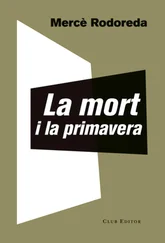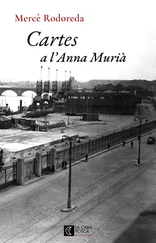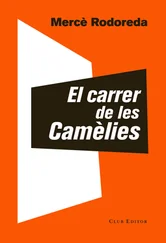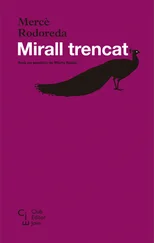It took a long time to dissolve the pills. She broke them in two with the tip of the spoon, but was afraid of making too much noise. Started cracking them with her teeth. The cup was too small. Took a bowl and poured everything into it. Added water. Half dissolved, half still whole, she drank it down. Horrible, horrible. Less horrible than—. . She became frightened, very frightened. Afraid of what, now? Afraid of what?
She was wearing a muslin dress, in carmine, with a white insert. The broad pleat on the bodice had a bouquet of forget-me-nots. She was wearing white socks, black patent-leather shoes, and a bow in her hair that was the same color as her dress, tied like a butterfly. Her mouth and nose were swollen, and she spoke with difficulty. The day before she had fallen from her grandfather’s bed — it was a meter high. She was doing somersaults and had split her upper lip. It had bled profusely.
Her parents and grandfather were closing doors and windows: the gate by the kitchen, the balcony off the dining room, the double doors on the roof terrace. Her mother had brought in the clothes from the line, still damp. That was the prudent thing to do. In this quiet, isolated area of Sant Gervasi, leaving a house closed for too long gave a sense that a surprise was in the air.
They ran into silly little Felipet on the street, his nose full of snot, his glance sad.
“You’re leaving now?”
What would he do the whole afternoon without Mercè? He felt a little intimidated — this was a different Mercè, a flaming-red Mercè who was going to participate in a comedy. In the last act she was pulled, half smothered, from a strongbox. “Your arms and legs, limp, you hear? You’ve got to pretend you’re dead,” the director told her at every rehearsal, because without realizing, her whole body would stiffen when the man picked her up.
Felipet watched them walking away, up Carrer de Paris. Mercè, her parents and grandfather growing tiny against the backdrop of Tibidabo.
The house was closed, deserted, its well-tended garden with jasmine, camellias, and gardenias, the old olive tree they used on sunny winter days for a pirate ship, or a lighthouse to guide lost ships — all of it, house and garden, seemed alien to him, as if he had never been inside.
•
They were going to “La Flora,” in the Guinardó area. They would pass by Josepets, where the trams were parked, and then by the open land that the neighborhood children used for a soccer field. They would see the square with the palm trees, the gardens along Travessera de Dalt, the flower boxes filled with yellow and pink tulips, lifeless rosebushes, the lilac and syringa by the window grills. The gardens where the wind sometimes carried the deep sound of rustling leaves and the fresh scent of honey, as if a swarm of bees was blending together thousands of scattered perfumes. As a young girl Mercè’s mother had danced at “La Flora.” Here she wore a long dress for the first time, her hair swept high on her head. Here she met her first suitor, had her first engagement. On Sundays, “La Flora” vibrated with polkas and mazurkas, waltzes and the Lancers Quadrille. Declarations of love, complicated intrigues between mothers of soon-to-be-married daughters created a dull, depressing music beneath the outburst of the cornet and the rather viscous violins and double bass. They danced on a red rug that crackled with nutshells. At the entrance a blind woman, short and obese, sold peanuts and bouquets of cardboard pansies in the shape of a heart. You had to walk up a steep slope to get there.
“What’s the surprise going to be, grandfather?”
They were inseparable. Not once had he ever reprimanded this rather unattractive, frail little girl who was as unruly as the March wind. She combed his hair every evening. Before going to bed, she would sit on the dining room table with a comb and some ribbons. If he was busy doing something, she would call to him, “Grandfather, come here so I can comb you.” He would sit in a chair and lower his head. He had long, thin white hair. She parted it with the comb and made little braids that she tied together with a bow. Early the next morning her grandfather would go out to sweep the sidewalk with his hair like that and complain to all the passing neighbors, “The things my granddaughter does!”
“Will there really be a surprise?”
“A big one.”
She was so excited about the surprise that halfway through one of the acts, she exited the scene through the wings. Then she didn’t remember she had to close her eyes when the man removed her from the strongbox and carried her in his arms. When they called to her, “Ketty, Ketty,” she didn’t respond, didn’t remember that was her name in the comedy. The curtain fell. When the audience applauded and the curtain went up again, her fat, jovial grandfather appeared on stage wearing his black tailcoat and striped trousers, that still smelled of mothballs, and placed a large doll in her arms.
•
It came up to her waist. It could move its hands, elbows, knees. It opened and shut its eyes. At first she didn’t like it at all. But since everyone kept saying how beautiful it was, and Felipet was almost speechless when he saw it, soon she grew quite proud of it.
She would call her Ketty. All the neighbors participated in the christening. Some old curtains and a few scraps of material were used to make the robes for the priest and altar boys. The garden was full of flowers, happiness, and the haze of a summer afternoon. Her grandfather struggled to fit everyone into the frame of his camera. Mercè was the mother. She wasn’t wearing the scarlet dress, but a white one with a large satin bow at the waist. Everybody was dressed up. In a corner of the garden, sitting on the green-colored iron table surrounded by chairs, were two trays overflowing with pastries, permeating everything with the smell of cream, sponge cake, chocolate, and vanilla.
“Quiet, everyone. Quiet!”
Click.
•
Over the next few days the doll acquired a certain prestige. They talked of her at the table. Friends stopped by to see her. They strolled with her in the Turó Park where all the children turned to stare in amazement. Felipet was thrilled, but he would have wished to play with the doll all by himself. The blue eyes that closed, the soft squeaking of her joints awoke in him a secret tenderness.
“Can I take her home with me?”
“No.”
She straightened the doll’s dress, fixed her hair, dried her hands, pulled up her socks so they wouldn’t be wrinkled. But when she was alone with the doll, she didn’t even look at her. The doll was too tall and that caused her anguish. Like a young mother who suddenly finds a ten-year-old daughter sitting on her lap. Little by little she forgot about her.
It was much more exciting to play cops and robbers, hide under the Chinese tomato bush, climb the pomegranate tree with its thin, thorny branches. The trees were in the garden behind the house. The garden in front was elegant: carpeted with sand from the sea, full of shells and pebbles that were white as pine nuts, pink as coral. Every year the family would order a meter of sand to be delivered. They would bring it in the morning, still damp, and the smell of the sea would pervade the entire garden.
•
Who would remember the doll, if you discovered a whole case of gasosa ? Felipet and Mercè found it beneath the hydrangea that stood in the shadiest corner of the garden, hidden by a cluster of leaves. They didn’t know how to open the bottles. They were scared of being caught, and your teeth had to be really strong if you wanted to hear the loud “pop” when the mist and little bubbles rushed up. They spent long hours, hesitating, beneath the hydrangea. They were always reluctant to leave and returned as soon as possible, anxious to take a peek.
Читать дальше












